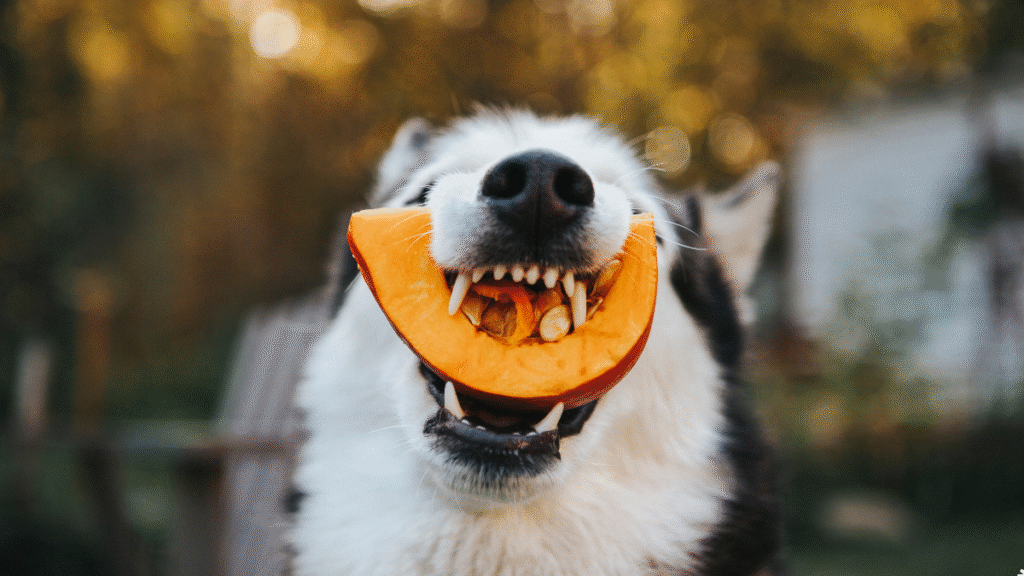Maintaining good oral health is a crucial yet commonly overlooked aspect of dog care. Many pet owners focus on diets that promote a shiny coat, increased energy, or better digestion—but often forget that what they feed their dogs also has a major impact on their teeth and gums.
Like humans, dogs are susceptible to plaque, tartar, bad breath, tooth decay, and painful periodontal disease if they don’t receive proper dental care. The good news is that a balanced diet can greatly support your dog’s oral health, keeping their teeth strong, clean, and healthy.
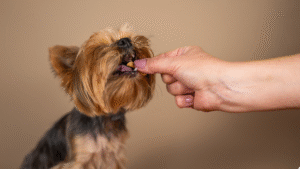
Factors Affecting Your Dog’s Dental Health
Dogs are carnivores by nature, so their teeth are adapted for ripping and crunching meat, not grinding like ours. In the wild, dogs would chew on raw bones, tendons, and meat, which helped clean their teeth naturally. Domestic dogs, however, are often fed soft, processed foods that coat their teeth with sticky residues.
When combined with saliva and bacteria, these residues form plaque—a soft film that, if not cleaned, hardens into tartar and builds up along the gum line. Tartar irritates the gums and can lead to gingivitis, decayed teeth, and periodontal (gum) disease. Periodontal disease is painful and affects your dog’s ability to chew. Worse still, bacteria from infected gums can enter the bloodstream, potentially harming the heart, liver, kidneys, and other vital organs.
With so much at stake, it’s clear that a well-balanced diet designed with dental care in mind is essential.
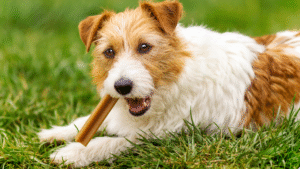
Tips for Building Strong Teeth
1. Choose the Right Dog Food
Select a high-quality dry food as your dog’s primary nutrition source.
Dry Food (Kibble) vs. Wet Food
Dry kibble is slightly abrasive, which helps scrape away plaque as your dog chews. Wet food, on the other hand, is softer and tends to stick to teeth and gums, encouraging plaque formation.
Don’t fall for cheap supermarket brands. Read labels carefully and avoid foods with fillers such as corn, wheat, and soy. Stick to natural, whole-food ingredients as much as possible, and look for dog food that is low in sugars and carbohydrates, since excess starch fuels bacterial growth.
Combining dry and wet food is perfectly fine if both are chosen with dental health in mind. Wet food is more hydrating and palatable, while dry food does a better job of cleaning. If you feed both, remember to brush your dog’s teeth regularly or at least provide dental chews.
2. Offer Raw Meaty Bones (Safety First)
Raw, meaty bones are one of the best natural ways to clean and strengthen your dog’s teeth. As your dog chews and gnaws on them, plaque is scraped away while calcium and phosphorus—minerals essential for strong bones and teeth—are absorbed.
Always give your dog only raw bones. Cooked bones can splinter and cause choking or internal injuries. Choose an appropriate size of raw bone based on your dog’s breed, size, and chewing strength. Larger dogs can enjoy beef marrow bones, while smaller dogs do better with raw chicken necks or wings.
To ensure safety, supervise your dog while chewing and remove the bone after 10–15 minutes to prevent swallowing large pieces. Limit this treat to a few times a week due to its high calcium and fat content.
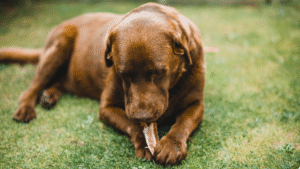
3. Add Crunchy Fruits and Vegetables
Certain fruits and vegetables act like natural toothbrushes for dogs. Crunchy foods help remove plaque, while their vitamins and antioxidants promote healthy gums.
Some of the best options include:
-
Carrots: High in vitamin A and fiber, they gently scrub teeth and stimulate saliva production.
-
Apples (without seeds): Rich in vitamin C and enzymes, they help freshen breath and provide mild cleaning action.
-
Celery: Offers antioxidants for gum tissue and mechanical cleaning through chewing.
-
Cucumbers: Hydrating, low-calorie, and effective at removing food residue.
Always feed fruits and vegetables in safe quantities and remove any seeds or pits. Avoid acidic or sugary foods like oranges, grapes, or raisins, which can damage teeth or cause other health issues.
4. Feed Calcium- and Phosphorus-Rich Foods
Calcium and phosphorus are vital minerals that give teeth and bones their strength. They’re essential for developing and maintaining healthy enamel.
Healthy sources include:
-
Raw dairy products such as plain yogurt or kefir (if your dog is not lactose-intolerant).
-
Fish, particularly sardines and salmon, which are rich in calcium and omega-3 fatty acids that support gum health.
-
Leafy greens like kale and spinach (lightly steamed or blanched for easier digestion).
-
Finely ground eggshell powder, which is a natural source of calcium you can sprinkle over food.
Be cautious not to overdo phosphorus (by feeding only meat), as it can weaken teeth and bones. Likewise, too much calcium can cause mineral imbalances.
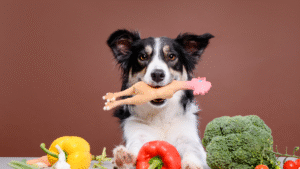
5. Use Dental Chews and Treats
Dental chews and treats are excellent tools for maintaining oral hygiene. Look for VOHC (Veterinary Oral Health Council)-approved chews that are proven to reduce plaque and tartar buildup.
Some natural options include:
-
Raw beef tendons
-
Bully sticks
-
Dried sweet potato chews
Avoid rawhide and similar products, as they can be hard to digest and may contain harmful chemicals or bacteria.
6. Avoid Sugar and Processed Ingredients
Sugar is one of the biggest contributors to oral bacteria, plaque, tartar, and gum inflammation in dogs—just as it is for humans. Always check ingredient labels and steer clear of dog foods and treats with added sugars, syrups, or molasses.
Avoid artificial preservatives, colors, and sweeteners whenever possible. Choose natural, whole-food ingredients instead.
Important: Never use products containing xylitol, as it is toxic to dogs.
7. Consider Dental Supplements
In addition to a good diet, dental supplements can further strengthen your dog’s teeth and gums. These can be added to their daily meals with your vet’s approval.
Recommended options include:
-
Probiotics: Help balance oral bacteria and reduce bad breath.
-
Sea kelp or seaweed powder: Naturally breaks down plaque and freshens breath.
-
Omega-3 fatty acids: Reduce gum inflammation and improve gum tissue health.
-
Vitamin C: Promotes collagen production in the gums, strengthening their resistance to infection.
Always consult your veterinarian to ensure proper dosage and compatibility with your dog’s existing diet.
8. Keep Your Dog Hydrated
Water helps wash away food particles, bacteria, and debris from your dog’s mouth, reducing plaque buildup. It also promotes saliva flow, which naturally cleanses the mouth.
Make sure your dog always has access to fresh, clean water, and replace it several times a day. Dental water additives can also help reduce bacteria and freshen breath, but check with your vet before using them.
9. Stick to a Routine
Even the best diet can’t completely replace regular cleaning. To get the most out of your dog’s dental care, establish a consistent oral hygiene routine.
Here are some tips:
-
Brush your dog’s teeth 1–3 times a week using canine toothpaste and a soft-bristled toothbrush.
-
Schedule professional cleanings and dental checkups at least once a year.
-
Provide chew toys that encourage mechanical cleaning and healthy chewing habits.
10. Consider Raw or Fresh Diets
Raw diets (such as BARF—Biologically Appropriate Raw Food) and fresh, lightly cooked diets are growing in popularity among dog owners seeking natural nutrition. These diets often include raw or cooked meat, bones, and vegetables that encourage chewing and help clean teeth.
However, a raw or fresh diet requires careful planning to ensure nutritional balance and food safety. Always consult your vet or a certified veterinary nutritionist before switching. Ensure the diet includes the right balance of protein, fat, vitamins, and minerals.
Related:10 Healthy Cat Treats They Will Come Running For
Final Recommendations for Strong Teeth
Healthy teeth are an essential part of your dog’s overall well-being. By prioritizing diet and dental care, you can help your dog maintain a clean, strong set of teeth. This not only results in fresher breath but also protects against infection, pain, and systemic diseases.
Top tips to strengthen your dog’s teeth:
-
Choose high-quality, low-carb kibble and avoid sugary foods.
-
Include raw bones, crunchy vegetables, and calcium-rich foods in the diet.
-
Use dental chews and supplements to support oral hygiene.
-
Brush teeth regularly and schedule annual vet checkups.
By following these guidelines, you’ll give your dog the gift of strong teeth, healthy gums, and a lifetime of happy, confident smiles.
Save pin for later
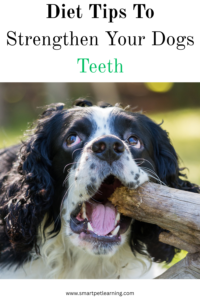
- Why Cats Avoid Eye Contact - January 31, 2026
- How to Stop Cats From Climbing Where They Shouldn’t - January 31, 2026
- Why Dogs Get Hyper at Night - January 31, 2026
